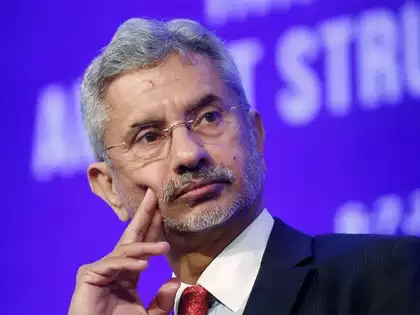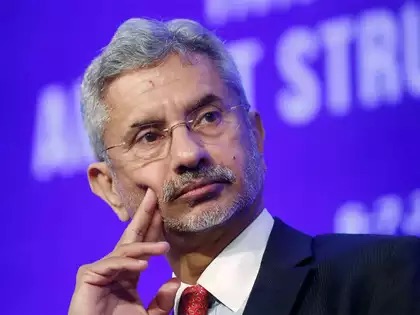EAM Jaishankar Highlights India’s Rapid Progress and Calls for Diaspora Engagement

Indian External Affairs Minister S. Jaishankar has urged the Indian diaspora to actively contribute to India’s progress, emphasizing the accomplishments of the Modi government over the past nine years. He clarified that India’s pursuit of self-reliance does not imply protectionism or isolation but rather a commitment to global engagement. During his speech in Cape Town, Jaishankar highlighted the special relationship between India and South Africa, noting that bilateral trade between the two countries currently stands at around USD 18 billion. He also emphasized the ongoing cooperation in various important sectors.
During a reception in Cape Town, External Affairs Minister S. Jaishankar emphasized that India has shed its slow-paced image and urged the diaspora to actively contribute to the country’s growth. Speaking at an event organized by the Indian diaspora and expatriate community, Jaishankar also discussed the special bond between India and South Africa, which are commemorating 30 years of new diplomatic ties.
Attending the BRICS bloc’s meeting in Cape Town alongside counterparts from Brazil, Russia, and China, Jaishankar confidently asserted that India has embraced digital practices and efficiencies surpassing those found in Europe and North America. He underscored the massive scale of transformation that India has experienced over the past nine years, emphasizing the importance of the Indian community abroad, non-resident Indians, and friends of India worldwide in recognizing the magnitude of these changes.
In his address, Jaishankar highlighted the need for the diaspora’s active participation and involvement in India’s ongoing development. He also discussed India’s achievements under the Modi government, including policy reforms and actions to enhance self-reliance, clarifying that India’s pursuit of self-reliance does not mean isolating itself but rather actively engaging with the world and fostering partnerships. Notably, India’s record-breaking foreign direct investment (FDI) of USD 86 billion last year exemplifies the country’s success.
Looking ahead, Jaishankar outlined India’s vision for the next 25 years, envisioning a future where the current generation can accomplish even greater feats on a grander scale. He emphasized that India’s rise as a civilization state will have a significant impact and serve as an inspiration for others across the globe.
Regarding the India-South Africa relationship, Jaishankar highlighted the historical association between the two nations, particularly in their shared support for each other during India’s struggle against apartheid.
He mentioned the flourishing trade between India and South Africa, amounting to approximately USD 18 billion, as well as cooperation in various fields such as international issues, sports (like cricket), wildlife conservation (such as the cheetah reintroduction in India), and healthcare (including COVID-19 vaccines).
While acknowledging the challenges faced by visa applicants from South Africa, Jaishankar mentioned India’s efficient e-visa system for South African applicants. He expressed the hope that South Africa would reciprocate with a similar arrangement and conveyed his intention to discuss this matter in the coming months through government-level interactions.
External Affairs Minister S. Jaishankar emphasized the significance of diaspora engagement and involvement in India’s ongoing progress. Highlighting the achievements of the Modi government during its nine-year tenure, Jaishankar underscored that India’s pursuit of self-reliance is not synonymous with protectionism but rather a commitment to producing more within India while contributing to and collaborating with the world.
He highlighted India’s active efforts in forging partnerships, which have resulted in attracting substantial foreign direct investments (FDI). India’s FDI of USD 86 billion last year was the largest in the world.
Jaishankar expressed great confidence in India’s accomplishments and ambitious aspirations at home. Looking ahead, he stressed the importance of inspiring the current generation by showcasing their potential to achieve even greater feats on a global scale.
Additionally, Jaishankar emphasized India’s rise as a civilization state, which not only leaves a profound impact but also serves as an inspiration for others worldwide. Referring to the historical ties between India and South Africa, Jaishankar highlighted the deep-rooted symbolism associated with the support provided by India during South Africa’s struggle against apartheid, which remains a strong bond between the two nations.
Reflecting on the association with Nelson Mandela as an inspirational leader during the struggle for self-determination, Minister Jaishankar highlighted the flourishing relations between India and South Africa over the past three decades.
The current trade volume between the two countries stands at approximately USD 18 billion. The minister also emphasized the extensive cooperation between India and South Africa across various domains, including international issues, cricket, cheetah reintroduction, and collaboration in COVID-19 vaccines.
Expressing a strong bond of friendship, Minister Jaishankar regarded South Africa as one of India’s closest allies when observing the global landscape of nearly 200 countries. Regarding the future of the India-South Africa relationship beyond the upcoming 30-year celebration in November, Jaishankar expressed India’s vision for enhanced mobility and greater knowledge exchange between the two nations.
Addressing concerns about visa difficulties for visits to South Africa, Minister Jaishankar pointed out that India has successfully implemented an efficient e-visa system for South African applicants. He acknowledged the need for a counterpart arrangement by South Africa, considering challenges faced by intra-company transferees and family members. He expressed his awareness of the issue and conveyed his intention to discuss it with his colleague. Additionally, Jaishankar expressed hope that the Joint Committee responsible for government-to-government interactions would address these concerns in the coming months.












